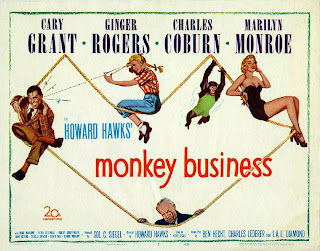Wise: You said it! Juliette Lewis has built an entire career on her big-hearted quirkiness.
Werth: Juliette Lewis? I'm talking about silver screen star and Cross-Your-Heart bra icon, Jane Russell.
Wise: Should we toss a coin or compare cup sizes to see who goes first?
Werth: Decades before Juliette was making lewd tongue gestures at Robert DeNiro, Minnesota native Ernestine Jane Geraldine Russell was one of the most talked-about women in Hollywood.
Her film debut The Outlaw (1943) is the story of Billy the Kid, but one look at the marketing and it was obvious that producer/director Howard Hughes was more interested in telling the story of Jane Russell's cleavage. It was a strategy that worked, and Jane Russell was soon one of the most recognized starlets in Hollywood. Fast forward ten years and Russell's ample talents were being showcased again in what would become another iconic "body" film.
Gentlemen Prefer Blondes (1953) follows chorusgirls Dorothy Shaw (Russell) and Lorelei Lee (Marilyn Monroe) as they take a cruise to France to get Lorelei's millionaire boyfriend (Tommy Noonan) to chase her across the Atlantic.
Wise: Which is a clever strategy because most people run toward millionaires—unless it's Donald Trump.
Werth: Dorothy and Lorelei are the perfect female odd couple. Dorothy is streetwise, sensible and crass; wisecracking that she is looking for a man "who can run faster than I can" as she marches through a gym populated by Olympic athletes.
Lorelei, on the other hand, couldn't care less what a man looks like as long as his wallet is handsome. And while she might have trouble spelling "tiara," she's smart enough to get rich men to give her shiny objects of affection, even if they have to pry them off their wives' heads.
Wise: I didn't know you could use a chapeau as a safety deposit box.
Werth: Based on the popular musical, and directed by successful multi-genre director Howard Hawks, Gentlemen is a brisk, funny, tuneful romp that sustained Russell's career, and shot Monroe's into the stratosphere. Both actresses are perfect for their parts—and while that applies to their finely shaped body parts, it's important to remember that both of these gals were more than their measurements.
Russell's arch banter turns a noir-like worldliness into comic jousting. She's particularly adept at mimicry in one scene where she has to pretend to be Lorelei for a French nightcourt. And Monroe's "dumb" blonde routine was so masterful, it would become the gold standard for comedic female roles for years to come.
They definitely looked chummy in the photos where they are pressing their hands into the wet cement of Grauman's Chinese Theatre, memorializing Gentlemen Prefer Blondes and themselves for future film buffs.
and complicated both by an affair with an older married woman (Mary Steenburgen) and by the depression of his severely obese mother (Darlene Cates). As Gilbert grows increasingly frustrated by life, his troubles multiply, and he risks losing Becky's steadying influence.
Werth: If Becky were as big as his mother, she'd be more steadying.
Wise: Depp brings tremendous sensitivity to the role, making Gilbert sympathetic while still acknowledging the character's faults. Revisiting the film, it can be a shock to see Depp so modulated, particularly because his current career seems dedicated to outlandishness.
He and Lewis are particularly well-matched in the film, and the halting steps they take in revealing their mutual attraction feels painfully real. Also painfully real is Darlene Cates as Gilbert's mother.
Discovered by screenwriter Peter Hedges (who adapted his own novel) on an episode of The Sally Jesse Raphael Show, Cates was an actual recluse who overcame her own insecurities about her weight to take on the role.
Werth: Cates lost 250 lbs. last year and is hoping to return to acting.
Wise: The breakout star of the film, of course, is DiCaprio who received an Best Supporting Oscar nomination for the role of Arnie. He loads the character full of verbal and gestural quirks without resorting into caricature or descending into the maudlin.
His Arnie has believable motivations and strong emotions that he expresses using the character's limited faculties. When Gilbert abandons him in the bath, Arnie is angry, and even though he is unable to articulate his frustration in words, DiCaprio communicates his character's indignation and hurt as forcefully as any speech.
Director Lasse Halström carefully integrates his cast's vibrant performances with the sweetly elegiac tone of the film, making Gilbert Grape both a showcase for some great acting as well as a beautifully rendered meditation on life.
Werth: Since this is a birthday post, we need cake.
Wise: I'll grab my 'J'-shaped cake pan. Visit us again next week for more alphabetically delicious Film Gab!

























---Cary-Grant,-Joan-Fontaine-791379.jpg)




























